

Meet Dr. Mitra Panahi, one of our Biology instructors and our new Department Head for Math and Science! Dr. Panahi has a lot of experience teaching biology courses at post-secondary institutions in Vancouver and Ottawa and has over 10 years of teaching experience at Alexander College alone.
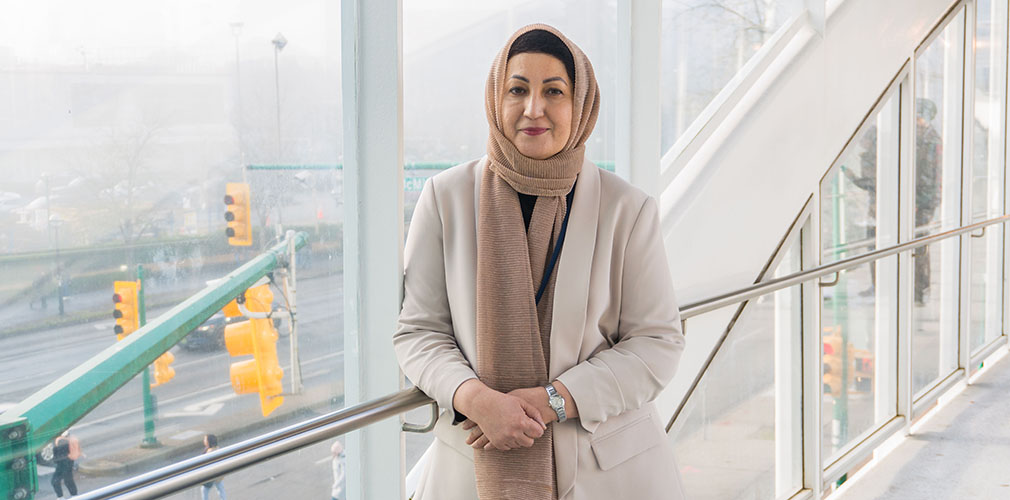
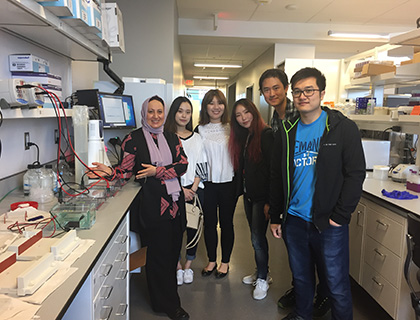
Q. Tell me a little about yourself and what you do.
I am originally from Iran and came to Canada as an international student. I completed my studies at the University of Ottawa, Ontario, earning a Ph.D. in Biochemistry. Following that, I undertook a postdoctoral fellowship at Health Canada in Ottawa.
Later, I was awarded a fellowship by Canadian Blood Services to explore the novel functions of blood coagulation factors at the Centre for Blood Research at the University of British Columbia (UBC).
Q. What are your hobbies?
I enjoy reading science fiction and listening to music from all over the world.
Q. What is a fun fact about yourself?
A fun fact about me is that I feel like the ‘mom’ of my students. I often make mom-like comments, like reminding them not to use drugs and alcohol, study well, eat before exams, or get enough sleep—it’s my way of showing I care!
Q. What are some of your achievements and publications?
During my Ph.D. research, which focused on the expression of human therapeutics in transgenic plants, I was awarded a Ph.D. scholarship from GENENTECH Pharmaceuticals in California, USA.
This project later evolved to explore treatments for diabetes patients who were unresponsive to insulin. This was very rewarding for me to see all hard work in research labs could improve the quality of life of patients.
I also took part in many international conferences to present various research data to international scientists and I had a chance to win a poster presentation at the Sixth Ottawa Life Science Conference.
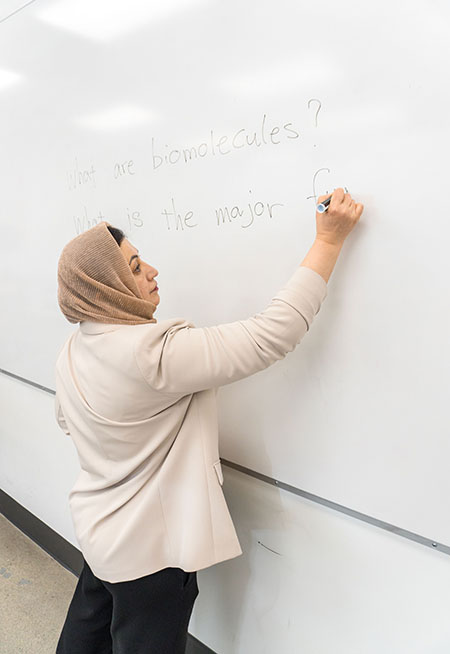
Q. Which of your publications or projects are you most proud of, and why does it stand out to you?
I enjoyed a pharmacokinetic study from Health Canada on the effects of echinacea extracts in treating individuals with weak immune systems.
This extract, widely used by Indigenous peoples for its medicinal properties, is one of the most popular medicinal plants due to its immunostimulant effects. My colleagues and I analyzed its chemical composition and conducted a comprehensive biochemical analysis.
It was fascinating to discover that not only Canadian Indigenous communities but also traditional medicine practitioners from countries like China and Persia have long recognized and utilized this extract to address a broad range of immune-related disorders.
Q. What do you like about Alexander College?
I appreciate the collaborative environment, where I get to work alongside passionate colleagues who share a commitment to fostering curiosity and critical thinking in our students.
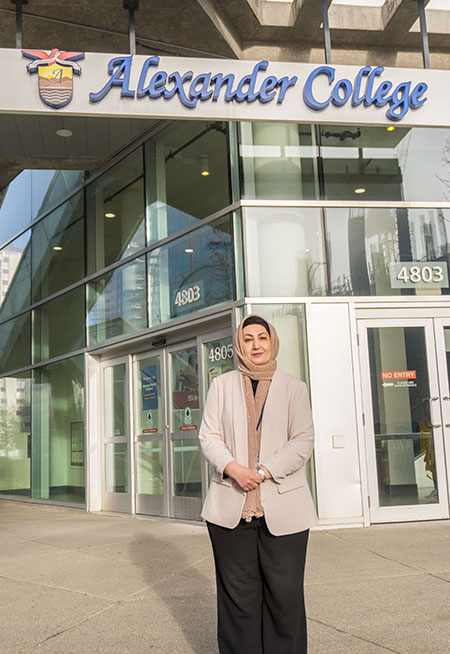
Q. Congratulations on becoming the new Department Head for Math and Science! What are your thoughts on stepping into this position?
Thank you! I’m honored to take on this role and excited to serve as the new Department Head for Math and Science. As a biology faculty, I’ve always loved using creativity to engage students actively, and I hope to bring that same energy to our department.
My goal is to foster collaboration, support our faculty and students, and continue building a strong, and innovative program. I look forward to working together to reach the mission of our college through the math and science department!
I am also grateful for the mentorship of Dr. Kelly Cheung, the former Department Head, who has since been promoted to Associate Dean of Sciences, Business, and Program Assessment.
Q. What are some common misconceptions students have about the subject that you teach and how do you address them?
One common misconception students often have about biology is that it’s all about memorizing facts. They think it’s just about learning a list of terms and definitions rather than understanding the why and how behind living systems. To address this, I emphasize critical thinking and real-world applications.
For example, instead of just listing the steps of cellular respiration, I’ll connect it to why they feel tired after a workout or how their body processes energy from food.
Another misconception is that biology is purely theoretical and not connected to their daily lives. I counter this by using relatable examples, like explaining how biology impacts the food they eat, their health, or even the ecosystems they interact with daily.
I hope I change this misconception and make our students look at biology as a subject that is both fascinating and approachable.
Q. I’ve read that you like to involve students in ‘active learning’. Could you tell me a bit more about that?
Absolutely! Active learning is all about engaging students directly in the learning process rather than just having them passively listen to lectures. In my biology classes, this could mean group discussions, hands-on activities, or problem-solving exercises that allow students to explore concepts more deeply.
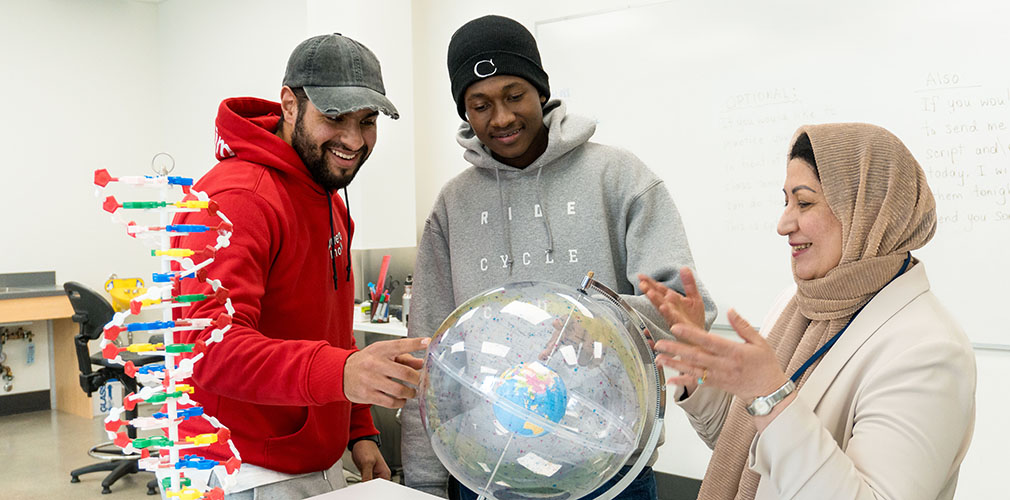
For instance, instead of simply lecturing about genetics, I might have students work in pairs to solve a genetic inheritance puzzle or simulate the process of meiosis using pipe cleaners. I also use scenarios like “design a creature that could survive on Mars” to spark creativity while applying biological principles.
Active learning helps students retain information better because they’re thinking critically, making connections, and sometimes even teaching each other. Plus, it’s more fun! My goal is to make the classroom a dynamic environment where students feel invested in their learning.
Q. What do you see students struggling with the most and what advice would you give them?
One of the biggest struggles I see students face is managing their time effectively. Biology is a subject that requires not just understanding but also consistent practice and review. Many students wait until just before exams to dive into the material, which can feel overwhelming.
My advice is to break the work into smaller, manageable chunks. Spend a little time each day reviewing notes, practicing problems, or making connections to everyday life. Think of it like taking care of a plant—consistent, small efforts lead to growth!
Another common challenge is dealing with self-doubt when faced with complex topics. I remind students that biology is a vast field, and it’s okay to not grasp everything immediately. Stay curious, ask questions, and don’t hesitate to seek help.
As their unofficial classroom “mom,” I always tell them: “You’ve got this, but if you don’t yet, we’ll get there together!”
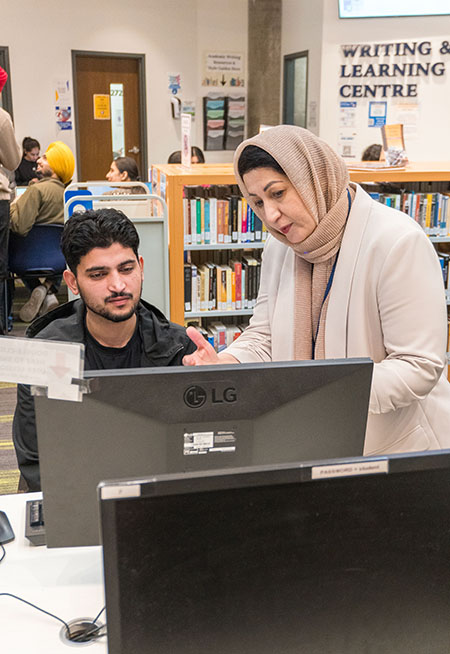
Q. If you could give advice to yourself when you were a student, what would it be?
If I could give advice to my younger student self, it would be this: Don’t be afraid to ask questions. I used to think that asking questions made me look like I wasn’t paying attention or that I wasn’t “smart enough.” Looking back, I realize that questions are how you learn—and chances are, someone else in the room is wondering the same thing.
I’d also remind myself that it’s okay not to be perfect. Success isn’t about never making mistakes; it’s about learning from them. It’s okay to not understand something right away as long as you keep trying.
And finally, I’d say: Make time for balance. While grades are important, so are experiences, and taking care of your mental health. Burnout helps no one, so remember to step back and enjoy the journey.
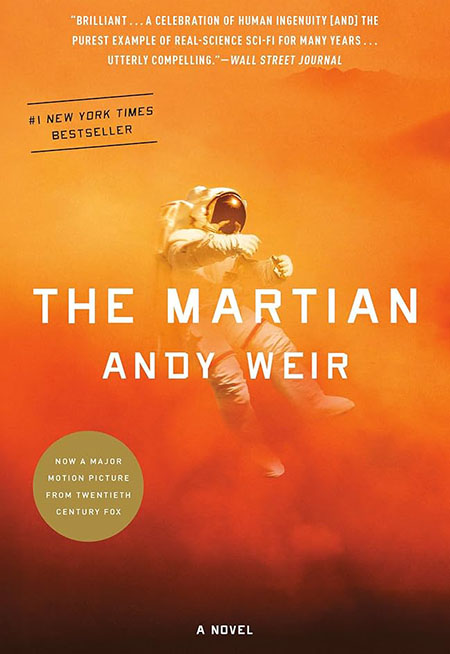
Q. What’s a book, movie, or activity you would recommend?
One science fiction book I recommend is The Martian by Andy Weir. It’s a fantastic blend of humor, science, and survival, following an astronaut stranded on Mars as he uses his knowledge of biology, chemistry, and engineering to stay alive.
The story makes science feel exciting and relatable, showing how creativity and critical thinking can solve even the toughest problems.
Q. Are there any additional things you want readers to know about you or just life in general?
I’d love readers to know that science isn’t just something you learn—it’s something you live. From the biology of how you wake up in the morning to the physics of your favorite sports or the chemistry behind cooking dinner, science is woven into everything we do. Learning it can be challenging, but it’s also endlessly fascinating and rewarding.
As for life in general, I’d say: Don’t be afraid to be curious. Ask “why,” explore “how,” and never stop learning. Also, remember that it’s okay to make mistakes—that’s how growth happens.
Lastly, a bit of personal philosophy: Find joy in the little things, like a good cup of coffee, a piece of good music or a movie, or the way plants grow toward sunlight. Whether in science or life, it’s the small, consistent efforts that lead to the most incredible outcomes. Oh, and don’t forget to laugh—it’s the best kind of energy boost! 😊
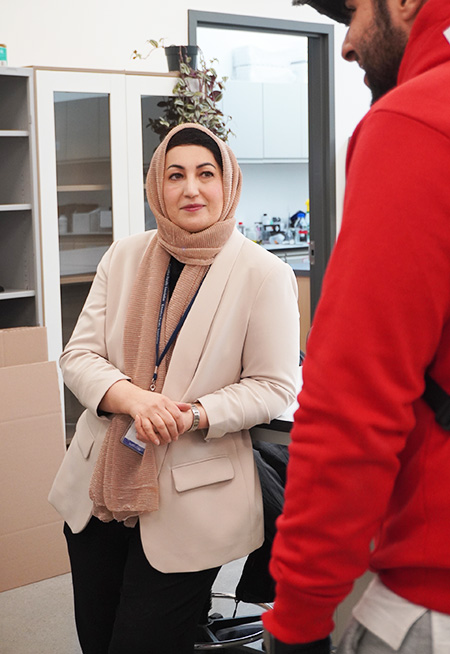
Alexander College acknowledges that the land on which we usually gather is the traditional, ancestral and unceded territory of the Coast Salish peoples, including the territories of the xʷməθkwəy̓əm (Musqueam), Skwxwú7mesh (Squamish), and Səl̓ílwətaʔ/Selilwitulh (Tsleil-Waututh) Nations. We are grateful to have the opportunity to work in this territory.
Alexander College acknowledges that the land on which we usually gather is the traditional, ancestral and unceded territory of the Coast Salish peoples, including the territories of the xʷməθkwəy̓əm (Musqueam), Skwxwú7mesh (Squamish), and Səl̓ílwətaʔ/Selilwitulh (Tsleil-Waututh) Nations. We are grateful to have the opportunity to work in this territory.